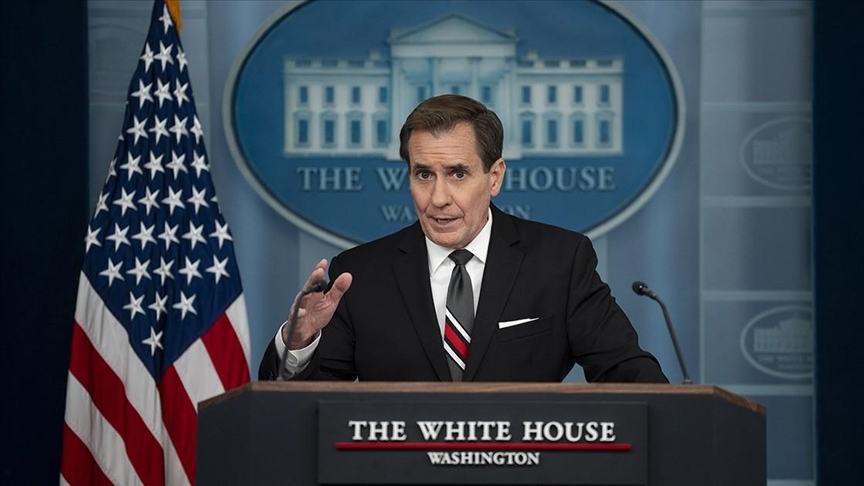US says it is giving Israel Gaza targeting information, then backtracks
White House says help with targeting Hamas leaders 'ongoing,' later denying 'helping them with specific targeting'; National Security Council does not clarify

WASHINGTON
The White House gave mixed messages Thursday on whether it is providing Israel with targeting information for its war in the besieged Gaza Strip.
National Security Council spokesperson John Kirby told reporters that the US is continuing to provide Israel with alternatives to its avowed ground invasion of the southern Gazan city of Rafah. "We could also, in fact, help them target the leaders, including Mr. Sinwar, which we are frankly doing with the Israelis on an ongoing basis."
Kirby was referring to Yahya Sinwar, the former Israeli prisoner who has climbed Hamas' ranks since his release in 2011 to become the head of the Palestinian group in Gaza.
But Kirby backtracked on the remarks when pressed by a reporter. "I'm not gonna get into the details, for operational security, of how we assist in counterterrorism."
"I did not say we're helping them with specific targeting," said Kirby, prompting pushback from the reporter. "We can help with setting the conditions for them to continue to go after Hamas leadership and, again, we've got terrific counterterrorism cooperation with them."
The National Security Council did not immediately return a request for clarification seeking to determine if the administration has been providing Tel Aviv with targeting information.
The Intercept online news outlet reported in January that the US sent a team of Air Force targeting officers to Israel, likely to help with the collection of intelligence to carry out airstrikes and artillery shelling.
The Pentagon has denied that the US is involved in the Israeli military’s “target development.”
Kirby's comments came one day after US President Joe Biden issued a stark warning to Israel not to proceed with plans for an invasion of Rafah, threatening to withhold weapons that would be instrumental to any such attack.
"I made it clear that if they go into Rafah – they haven’t gone in Rafah yet -- if they go into Rafah, I’m not supplying the weapons that have been used historically to deal with Rafah, to deal with the cities -- that deal with that problem," Biden said in an exclusive interview with CNN.
Kirby said the US hopes "it doesn't come to that."
"We hope that Israel won't do that. We hope that they will do what they've said to us about what they're going to do in Rafah, which is something of limited scale, scope, size and duration with respect to the crossing down there. It's important right now that we see that operation come to a close soon, and that we get that crossing back open," he added.
The crossing between Gaza and Egypt is one of two that Israel has closed in recent days. Israel closed it on Tuesday after its forces seized the Rafah border crossing.
The State Department had said the other crossing, Kerem Shalom, which links Israel to southern Gaza, would be opened by Wednesday after it was shuttered following a Hamas rocket attack nearby Sunday.
Kirby said the US believes Kerem Shalom is "technically open," but humanitarian aid deliveries have yet to resume through the crucial entry point.
"We're still trying to get the ground truth on that. That's concerning. We want to see that flow continue right away," he added.
Israel has pounded the Gaza Strip in retaliation for a Hamas-led attack in October, which killed less than 1,200 people.
More than 34,900 Palestinians have since been killed in Gaza, the vast majority of whom have been women and children. Over 78,500 others have been injured, according to Palestinian health authorities. Thousands remain missing.
Seven months into the Israeli war, vast swathes of Gaza lay in ruins, pushing 85% of the enclave’s population into internal displacement amid a crippling blockade of food, clean water and medicine, according to the UN. Most of the displaced have sought refuge in Rafah following earlier Israeli evacuation orders.
Israel is accused of genocide at the International Court of Justice.
An interim ruling in January said it is "plausible" that Tel Aviv is committing genocide in the coastal enclave, and ordered Tel Aviv to stop such acts and take measures to guarantee that humanitarian assistance is provided to civilians.








